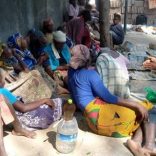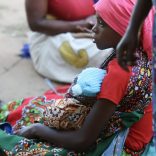U.S. commits $160 million in HIV, and TB support for Mozambique
Mozambique victim of World Bank “Doing Business” hoax – By Joseph Hanlon

Image:VOA
In this issue
World Bank scandal
- Mozambique victim of Doing Business hoax
- No link to real businesses
- Top Bank & IMF leaders rigged ranks
- Leadership by bullying
- For Moz: keep quiet and conform
Other news
- Covid-19 3rd wave over
- People – 1st black bishop dies at 103;
- Aires Ali caught by Pandora papers
Top World Bank & IMF leaders accused of rigging data & rankings as Bank forced to close Doing Business which turns out to be a grand hoax
The World Bank has stopped its flagship Doing Business report, due to “irregularities” and “ethical matters”, it announced on 16 September. Two of the most important people in global finance are accused of cooking the books: Kristalina Georgieva, now managing director of the IMF, and then World Bank CEO, and Jim Yong Kim, then-World Bank President. Georgieva denied all, issuing a statement saying “I disagree fundamentally with the findings and interpretations of the Investigation of Data Irregularities as it relates to my role in the World Bank’s Doing Business report of 2018.”
The scandal is important because it shows one cornerstone of the World’s Bank’s power was a two decade long hoax, of which Mozambique was a victim. An initial scandal forced two investigations. One said the Doing Business (DB) report involved no one who is in business in the subject countries, and its ranking is meaningless. But the Bank built up its hoax so that the rankings became globally important – so much so that China successfully put pressure on World Bank heads to improve its ranking. The investigations also exposed dishonesty and conflicts of interest at the very top of the Bank. And they exposed a culture of bullying, “terror and intimidation” in which staff and consultants could not challenge the imposed line.
This special issue is devoted to details of the scandal because these are the people telling Mozambique how to run the country, and they have made Mozambique the victim of a hoax which has forced them to impose harmful policies.
Doing Business was the key World Bank report to promote the free market, deregulation and foreign private investment. Its ranking of countries was front page news in many countries, including Mozambique, and for two decades was seized on by Bank officials and donors to put pressure on Mozambique (rank 138 of 190 in 2020) and similar countries to follow neo-liberal dictates.
Changes praised in DB including lowering corporate taxes, reducing contributions to workers’ pensions or healthcare and relaxing environmental protection rules, said Third World Network (TWN), It added that “what is good for business is not always good for people and the planet.”
In 2018 the World Bank chief economist and Nobel Prize winner Paul Romer publicly questioned the validity of DB in a Wall Street Journal interview, noting that the frequent methodological changes to the index created spurious changes in the rankings and communication failures, misleading the public. He said that Chile’s rankings may have been deliberately skewed under socialist President Michelle Bachelet. He was fired shortly after. Just after DB was formally closed, Romer told AFP that the current head of the IMF, in her previous senior role at the World Bank, engineered a “whitewash” of his concerns surrounding DB. He said there was a “lack of integrity” among the World Bank leadership, including then-CEO Kristalina Georgieva.
Whistleblower reports that staff had altered the DB 2018 and 2020 reports forced the Bank to commission two investigations in late 2020.
We report below on four key issues: no link to real businesses, high level corruption and political pressure, leadership by bullying, and an ongoing culture of pressure to keep quiet and conform. All Bank documents are on https://www.doingbusiness.org/en/doingbusiness
No link to real businesses; rank has ‘little meaning’
The Bank commissioned it own external academic panel review in December 2020 and its 2 September report was scathing. A handful of people look at the regulations and draw a conclusion based on a desk study of a single hypothetical firm, which is the same in all countries and thus irrelevant or wrong for some countries. However, different hypothetical firms are used for different indicators, making comparison impossible.
There is no analysis of “actual business owners and operators on their de facto experiences of doing business”. As to the country rankings, “Doing Business covers a diverse array of indicators that often have little meaning when aggregated with arbitrary weights.”
The panel calls on the Bank to “increase the number of contributors and make their selection more impartial” and to end the “haphazard approach to their selection”. “Currently, DB often relies on just 1 or 2 experts per country on a specific topic.” It also calls for reduction of “conflicts of interest with the Bank’s lending and advisory roles.” And the academic review points out that “conflicts of interest will arise whenever and wherever the Bank takes payment [from countries for consulting] about regulatory reforms while claiming to impartially judge those same reforms” in Doing Business.
The academic review stresses that there is no evidence that DB reforms lead to better development outcomes. And it confirms that recommendations “sometimes rewards policies that benefit business at the expense of broader social objectives,” adding “there is more to doing business than the absence of government interference.”
High level corruption and political pressure
The international law firm WilmerHale was commissioned by the Bank on 20 January this year to investigate the scandal and its 15 September report was damning. In 2017 “then-President Dr. Jim Yong Kim and then-CEO Dr. Kristalina Georgieva were overseeing the capital increase campaign” and China was concerned about its position, WilmerHale notes. China campaigned and then put increasing pressure on Kim and the DB team to raise its ranking. “CEO Georgieva [now IMF head] became directly involved in efforts to improve China’s ranking.” Eventually China’s ranking was improved from 85 to 78 at the last minute for the 2018 report, after “pressure from key aides to President Kim” and “pressure from CEO Georgieva and her Team”, WilmerHale says. As noted above, Georgieva denies this.
But at a later point in the report WilmerHale discusses a dispute about the role of Simeon Djankov, one of the founders of DB and later an advisor to CEO Georgieva. Djankov and Georgieva denied he was involved in the 2018 DB and in the China debate. WilmerHale points to extensive evidence that Djankov was involved “and we found the latter position more credible.” A damning indictment of the current head of the IMF.
For the 2020 report, Simeon Djankov, by then DEC (Development Economics) director, instructed the DB team to put Saudi Arabia in top place in the “Top Improvers” list, and move Jordan to number two. The reason, according to WilmerHale, was to “reward Saudi Arabia for the important role it played in the Bank community, including its significant and ongoing RAS projects.” Reimbursable Advisory Services (RAS) are paid advisory projects to middle and high-income counties and are highly profitable for the bank. “There were significant efforts to better integrate Doing Business considerations into the extensive set of Reimbursable Advisory Services (RAS) contracts that the Bank had executed with the country.”
WilmerHale adds that two factors “that could have motivated Mr. Djankov to modify the data in Saudi Arabia’s favor including Saudi Arabia having “a series of significant RAS contracts with the Bank, some focused on issues germane to the Doing Business report.” The other was that “elevating Saudi Arabia to first place in the Top Improvers list would demonstrate the effectiveness of the Bank’s efforts.” Fake the results to show that policies work.
Leadership by bullying
“In Doing Business 2020, Mr. Djankov ordered the Doing Business team to alter the country’s data based on his own belief that the country had not actually implemented the reforms the Doing Business team had credited. Indeed, multiple employees told us that Mr. Djankov appeared to harbor a personal animus against the country, unwilling to believe that the reforms the Doing Business team recognized – and confirmed – were legitimate. Despite the team’s efforts to convince him otherwise, Mr. Djankov overruled the team and demanded that it refrain from recognizing three Azeri reforms in Doing Business 2020,” reported WilmerHale.
“The improprieties described above required members of the Doing Business team to execute data changes that they knew were inappropriate.” WilmerHale says this was allowed to happen, first, because “members of the Doing Business team stated that they felt they had nowhere at the Bank to turn for support. With respect to Doing Business 2018, rank-and-file employees were told that the instructions to change China’s data came from the highest rungs of Bank management. Employees felt that they could not challenge an order from the Bank’s president or CEO without risking their jobs. With respect to Doing Business 2020, Mr. Djankov had publicly threatened at a team meeting that he had connections within the Bank’s Office of Ethics and Business Conduct (EBC) and that he would find out if anyone complained about him. Thus, staff members felt powerless to object to carrying out the data improprieties being requested by senior bank management.”
“Second, nearly every Doing Business employee with whom we spoke described the environment on the Doing Business team under the management of Mr. Djankov to be, at best, deeply problematic, and, at worse, emotionally harrowing. Employees said that Mr. Djankov was a ‘bully’ who instilled fear on the team; that he managed ‘by terror and intimidation’. … Notably, this critique of Mr. Djankov’s management style was near-universal from all those who worked under him at the Bank. Not surprisingly, a majority of the Doing Business employees with whom we spoke expressed a fear of retaliation from Mr. Djankov. … We heard from full-time employees on the Doing Business team that they, too, feared retaliation if they did not go along with Mr. Djankov’s wishes. Indeed, numerous employees provided examples of adverse employment actions.”
“The kind of intimidation this report describes was real,” former chief economist Romer told AFP.
An ongoing culture of pressure to keep quiet and conform.
Bullying is how the World Bank has run its flagship programme for two decades. And we argue it is true across the Bank, including in Mozambique, and has been for years.
I remember the late Roberto Chavez, World Bank resident representative in Maputo 1993-97. He publicly stood out against the World Bank roads plans for Mozambique. He was forced to undergo a psychiatric examination on the grounds that any Bank employee who publicly opposes Bank policy is obviously crazy. This has not changed in nearly three decades, and the result is a string of failed World Bank agriculture, social protection, microcredit and other projects because those who know better were afraid to speak out. Or they could not be listened to because they suggested that the World Bank hard line should be bent a little to reflect local conditions.
WilmerHale points out that “concerns that Mr. Djankov would retaliate against employees who challenged his decisions appears to have been felt most acutely by those employed under short-term consulting contracts. These employees feared the Bank could decide not to renew their contracts which, for some of them, would jeopardize their ability to remain in the United States.” That happens in Maputo, where those who speak out are not renewed.
In the World Bank, no one dared to say the emperor has no clothes. But now the Bank’s flagship Doing Business has been exposed as a hoax, a fraud, a con – perpetrated by people at the top of the World Bank and now at the top of the IMF.
The Bank’s culture of bullying will not change. But Mozambicans can now can point to Doing Business and question the Bank and Fund. They are now exposed as charlatans. They may control a lot of money, but they are no longer high priests who cannot be challenged.
Other News
- Covid-19 3rd wave over
Mozambique’s Covid-19 third wave is over. From a peak of 1896 new cases per day (7 day moving average) on 31 July the rate of new cases is down to 38 and still falling. Similarly deaths peaked at 26 per day on 1 August and have fallen to between 1 and 2 per day for the past three weeks.
Until recently reports of Covid-19 have been largely in Maputo city and province, which account for 80% of deaths. But this may be due to better reporting in the capital. Toward the end of the third wave there was a significant outbreak in the north, and the active cases on 2 October were 46% Maputo city and province, 25% Nampula, 14% Cabo Delgado and 6% Niassa (with other provinces 3% or less). (Miguel de Brito)
“Active cases” is ill-defined but is usually those still considered infectious – normally less than two weeks after their last symptoms.
So far, Mozambique has identified 150,000 Covid-19 cases with 1900 deaths (nearly all in the past year, as shown in the graph above).
In comparison
+ 1,000 people died in traffic accidents in 2020; 35% were pedestrians. (INE)
+ 14,000 died of Malaria in 2019 and there were 9 million cases. (World Malaria Report)
+ 38,000 people died of AIDS in 2020, 98,000 were newly infected, and 2.1 million are living with HIV. (UNAIDS)
People
- Deaths
- Cardinal Alexandre Jose Maria dos Santos died 29 September, aged 103. Ordained in 1953, he was the Portuguese colony’s first black priest, He became Mozambique’s first black bishop, then the Archbishop of Maputo, and finally in 1998 was appointed to the College of Cardinals by Pope John Paul II. He played a role in talks that led to peace in 1992 and set up Sao Tomas university.
Politics
- Leonardo Simao was named a “roving ambassador” by President Nyusi on 21 September. The former Foreign and Health minister is currently head of the Joaquim Chissano Foundation. In the Frelimo battle between the big beasts Nyusi and Guebuza, former president Joaquim Chissano will play a major role, and Nyusi needs his support.
Scandals
- Former Prime Minister Aires Ali, less than a month before he lost his post in 2012, used a Swiss-based tax consultancy to start a shell company called Stonelake Enterprises Ltd in the Seychelles. A Panama-based law firm, Alcogal, provided a shareholder and directors, thus obscuring Ali’s identity as the shell company’s owner. In 2013, Ali and his daughter, Judite Tânia Baptista Ali, reportedly authorised the company to open a bank account with a Lisbon-based wealth management firm. The report comes from the International Consortium of Investigative Journalists (ICIJ) Pandora investigation, being published this week.
By Joseph Hanlon












Leave a Reply
Be the First to Comment!
You must be logged in to post a comment.
You must be logged in to post a comment.